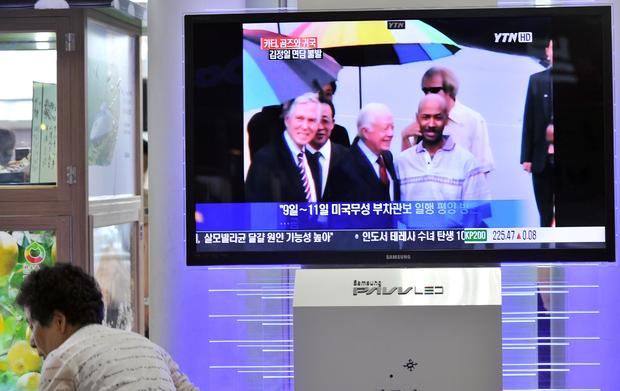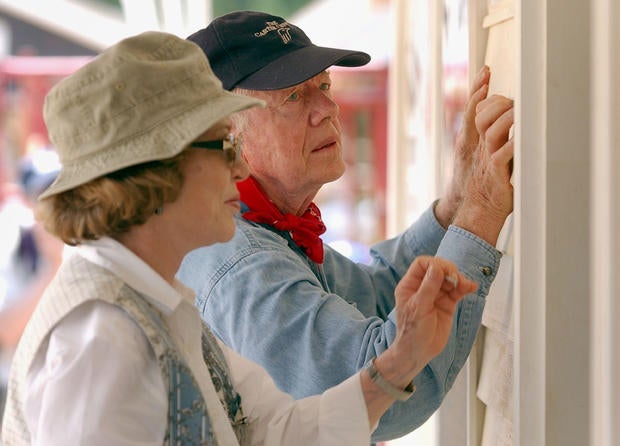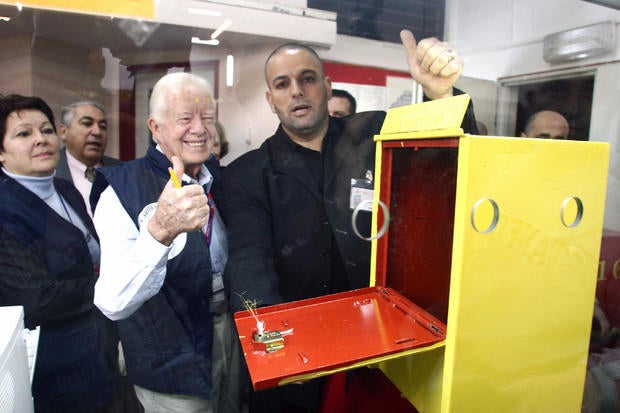
Jimmy Carter set the standard for the modern post-presidency
Elected in the aftermath of the Watergate scandal that brought down President Richard Nixon, Jimmy Carter, the former governor of Georgia, ran as a Washington outsider and rose to the White House with a strong sense of morality, an engineer’s mind and a progressive, moderate approach to governing.
Carter, who died Sunday at the age of 100, after going into hospice care in February 2023 at his home in Plains, Georgia, served only a single term in office but devoted the decades that followed to bettering the lives of countless people across the U.S. and around the world.
He faced massive crises during his presidency — sky-high oil prices, double-digit interest rates and inflation, and the Iran hostage crisis — and his failure to effectively address them resulted in his failure to win reelection in 1980. He also had some major accomplishments, including the negotiation of a peace deal between Egypt and Israel.
But it is his widely lauded post-presidency, characterized by tireless peace and humanitarian efforts, that is likely to be his most enduring legacy.
After leaving office in 1981, Carter became an important diplomatic figure, securing the release of political prisoners in Nicaragua in 1986 and of American Aijalon Gomes from North Korea in 2010. He served as a negotiator with North Korea during the Clinton administration, and even offered his services to then-President Trump in talks with North Korea.
Jung Yeon-je / AFP/Getty Images
Along with his wife, Rosalynn Carter — who died at age 96 on Nov. 19, 2023 — he founded the Carter Center in 1982, a nonprofit human rights organization that took on as its broad mission the alleviation of human suffering. Through the work of the Carter Center, he devoted himself to preventing and resolving global conflicts, promoting freedom and democracy, and improving the health of millions of people around the world.
Among other initiatives, the Carter Center oversaw efforts to conduct free and fair elections in dozens of countries in the developing world, and helped lead global efforts to eliminate Guinea worm disease, which spread through unfiltered drinking water and once sickened millions across Africa.
Carter was honored with the Nobel Peace Prize in 2002 for his work in advancing democracy and human rights through the Carter Center.
“We have transformed the lives of, I would say, millions of people, primarily in the poorest and most destitute and forgotten communities in the world,” he told CBS News‘ Rita Braver in a 2006 interview.
The Carters also worked for decades with Habitat for Humanity to build homes for those in need. Carter first became involved in 1984 and remained active building homes with the organization for decades. The day after he fell in his Plains, Georgia, home in October 2019, leaving him with a black eye and stitches at the age of 95, Carter still traveled to Tennessee to volunteer for Habitat for Humanity.
/ Getty Images
He and Rosalynn sponsored the Carter Work Project at Habitat for Humanity for over 30 years. According to the organization, the Carters have worked “alongside 104,000 volunteers in 14 countries to build, renovate and repair 4,390 homes.”
A devout Christian, the former president also made an impact in his local community as a teacher. He taught Sunday School at Maranatha Baptist Church in Plains until nearly the end of his life. He also taught at Emory University in Atlanta for nearly 40 years.
Carter acknowledged that his post-presidential activities had earned him higher regard than he’d experienced in office.
“Certainly my reputation has been better in the post-presidential years than maybe in the White House,” he said in that 2006 interview. “But I think that when people look at back on what we did in the White House, I think there’s a lot there of justifiable pride.”
Tiram Sasson/AFP via Getty Images
Throughout his post-presidency, he was never afraid to speak out when troubled by policies of those who succeeded him in the White House. He was an early and vocal critic of the war in Iraq begun under President George W. Bush, and he opposed the Obama administration’s use of drone strikes to target suspected terrorists.
He criticized Trump for “exacerbating” racial tensions and being “careless with the truth,” telling CBS News’ John Dickerson in 2018, “I think I went through my campaign and my presidency without ever lying to the people or making a deliberately false statement, and I think that would be a very worthwhile thing to reinsert into politics these days.” He added that he wished Trump well “and I pray for him.”
Carter joined fellow past presidents in condemning the Jan. 6, 2021, insurrection at the U.S. Capitol, and he marked the date one year later by writing: “I now fear that what we have fought so hard to achieve globally — the right to free, fair elections, unhindered by strongman politicians who seek nothing more than to grow their own power — has become dangerously fragile at home. … For American democracy to endure, we must demand that our leaders and candidates uphold the ideals of freedom and adhere to high standards of conduct.”
Carter wrote 33 books, including memoirs about his life and career, as well as books on other topics like faith and aging.
He and Rosalynn Carter were married for 77 years, and were known for their devotion to one another. They are survived by their four children and many grandchildren and great-grandchildren.
More
Source: cbsnews.com

